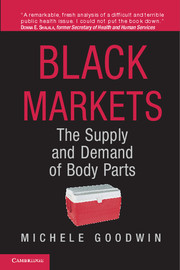Book contents
- Frontmatter
- Dedication
- Epigraph
- Contents
- Miscellaneous Frontmatter
- Preface
- Acknowledgments
- BLACK MARKETS
- PART ONE UNDERSTANDING THE STRAIN ON ALTRUISM
- PART TWO LEGAL FRAMEWORKS AND ALTERNATIVES
- PART THREE CRITIQUING THE SLAVERY AND BLACK BODY MARKET COMPARISON
- 9 Critiquing the Slavery and Black Body Market Comparison
- 10 Conclusion
- Notes
- Bibliography
- Index
9 - Critiquing the Slavery and Black Body Market Comparison
from PART THREE - CRITIQUING THE SLAVERY AND BLACK BODY MARKET COMPARISON
Published online by Cambridge University Press: 14 September 2019
- Frontmatter
- Dedication
- Epigraph
- Contents
- Miscellaneous Frontmatter
- Preface
- Acknowledgments
- BLACK MARKETS
- PART ONE UNDERSTANDING THE STRAIN ON ALTRUISM
- PART TWO LEGAL FRAMEWORKS AND ALTERNATIVES
- PART THREE CRITIQUING THE SLAVERY AND BLACK BODY MARKET COMPARISON
- 9 Critiquing the Slavery and Black Body Market Comparison
- 10 Conclusion
- Notes
- Bibliography
- Index
Summary
INTRODUCTION
A more persuasive race-based challenge to markets in organs might be that given the current practices of discrimination in society and levels of poverty, which disproportionately affect African Americans, private and public decision makers might be more sensitive to the health concerns of Whites and less so to Blacks. In this, commentators might be right; numerous studies reveal racial disparities in healthcare. Markets then might further correlate to that, but would not be causal, as discussed in Chapter 7. A market in cadaveric body parts will not be the cause of racial discrimination in America although it might reveal patterns of discrimination, which currently exists. Creating a transplantation system that promotes equity for all Americans is critically important. For this reason, I propose a hybrid model, which engages both altruism and a limited market in cadaveric organs, to increase the supply of organs. Such a model increases individual and collective autonomy, promotes greater organ awareness (there is an incentive in simply learning about whether organ donation is a worthwhile activity), and provides access for wealthy and poor individuals. Wealthier individuals can engage directly with markets and the altruistic pool can be utilized by the economically disenfranchised.
Relying exclusively on altruistic procurement, we avoid questions of property and ownership in the human body that obviously arise in market systems. The time has come where we must deal squarely with these issues. As discussed earlier, Richard Titmuss warned the West about devaluing human relationships through blood sales, cautioning that altruistic blood supplies could diminish, but more importantly that our humanity would slowly be bartered away. American slave images quite often attend these theories and are poor comparisons to a well-designed market system. By no means am I suggesting that altruism has exceeded its usefulness. To the contrary, by relying on altruistic procurement, organ transplantation as a medical model gained social and legal acceptance and credibility, but avoiding questions of human ownership and payments, both of which might have reduced the act itself to a purely contested political point in the 1980s.
In Chapter 8, I suggested that organ commoditization would not possess the exact dimensions and power relationships that once existed with slavery. This position stands contrary to the opinions of some bioethicists, and is perhaps considered radical by others.
- Type
- Chapter
- Information
- Black MarketsThe Supply and Demand of Body Parts, pp. 193 - 206Publisher: Cambridge University PressPrint publication year: 2006



